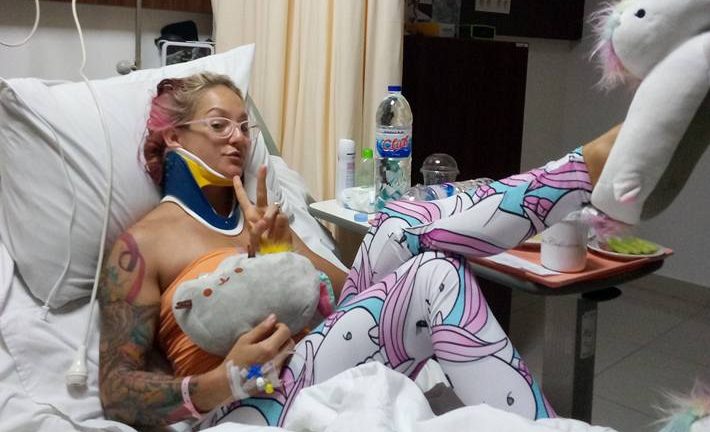
American Aerial Performer Sam Panda Breaks Neck after Equipment Failed in Bali
Sam Panda was living every traveler’s dream of seeing the world while making a living doing what she loves. The Myrtle Beach, South Carolina native is a trained circus performer and contortionist, as well an aerialist, and has performed in tourist hotspots like Greece and Jakarta.
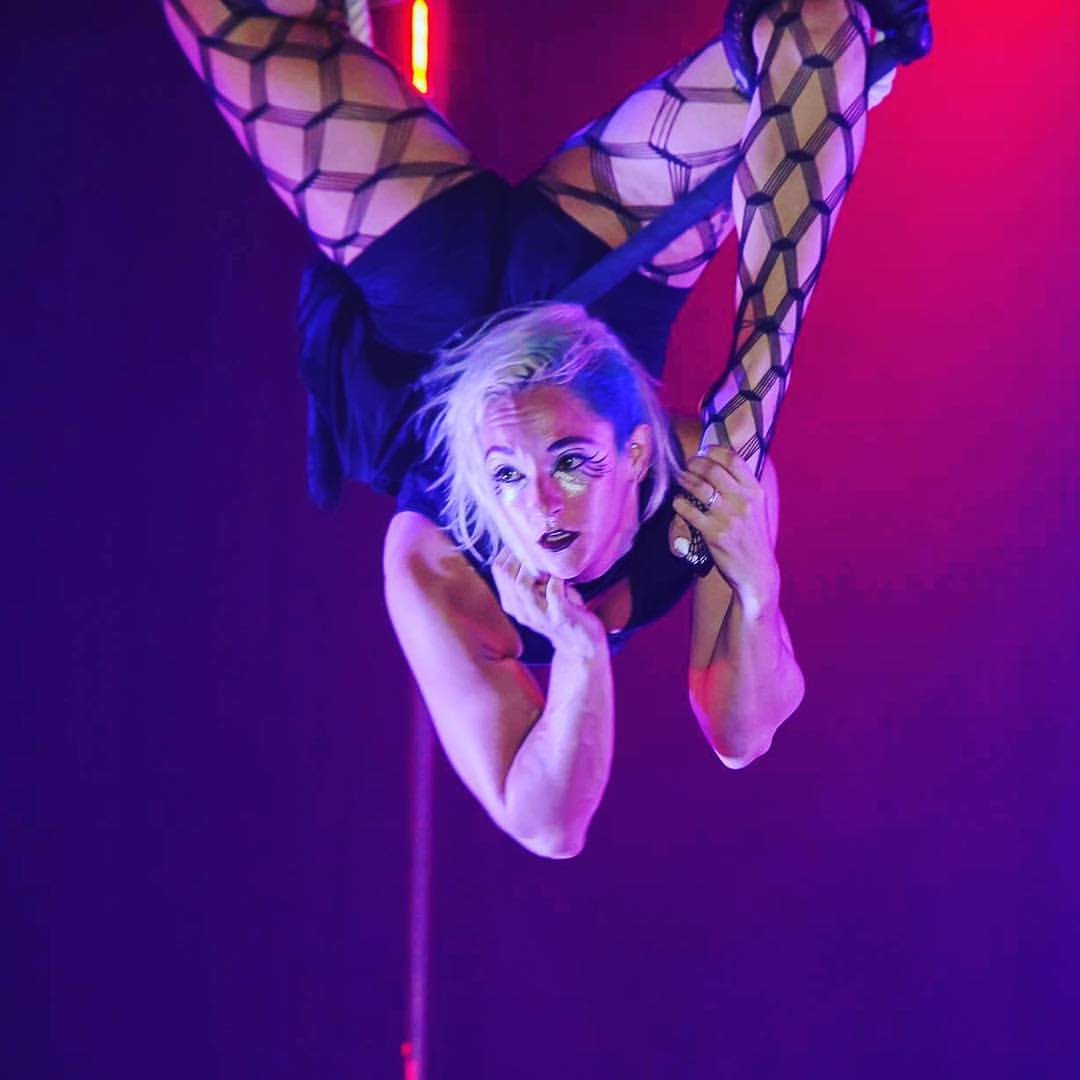
About six months ago, Panda moved to Bali with her husband, where he was training in mixed martial arts and took a job at Finn’s Beach Club Canggu entertaining guests with her mesmerizing talents. Things were going well for the young couple, but that changed October 26th.
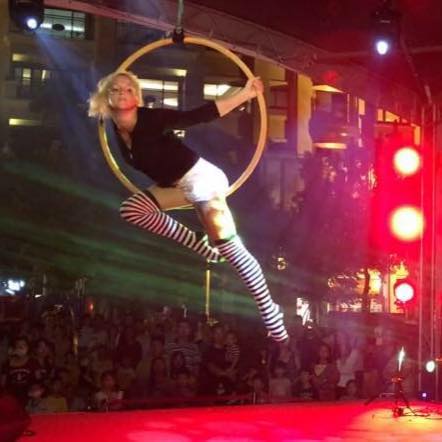
Panda was performing live in an aerial show when a rig she was on malfunctioned without warning. She broke her neck as she dropped approximately 13 feet onto the stage in front of a packed crowd. She survived the accident, but suffered severe injuries.
She explained her condition in a Facebook post.
“I have broken my C5 vertebrae (that means I broke my neck), burst the discs between my C5 and C6 as well as C6 and C7, and those are pushing into my spinal cord. I also had to get 8 stitches in my head. I am hospitalized at the moment. I am not paralyzed and can move my arms and legs, but I also cannot walk yet (spine can’t support my weight, plus I’m pretty weak and woozy).”

Doctors urged Panda to go elsewhere for the complicated surgery she would need and encouraged her to relocate to a different country in order to receive proper care. However, to medevac her to Taiwan, where she would be treated by specialists, it would cost around $40,000. And Finn’s, her employer, wouldn’t cover the costs, according to a Go Fund Me campaign that was started by family and friends.
“To all asking about the medevac: Finn’s has not paid for anything nor have they passed on any well wishes nor been in contact with the performer daily as they are claiming in their responses. We know this because WE are in daily contact with her,” a friend wrote on the Go Fund Me page.
So for 12 days, Panda was forced to stay in a hospital that wasn’t equipped to treat her. A video (which I’m not posting because the family respectfully asked me not to) of Panda’s fall quickly spread online. Angry viewers flooded Finn’s Facebook page with negative reviews and questions as to why they refused to pay for the medevac. Their response was to have employees write fake positive reviews, but that proved to be ineffective due to the overwhelming amount of harsh feedback, so they disabled the review option from their Facebook page.
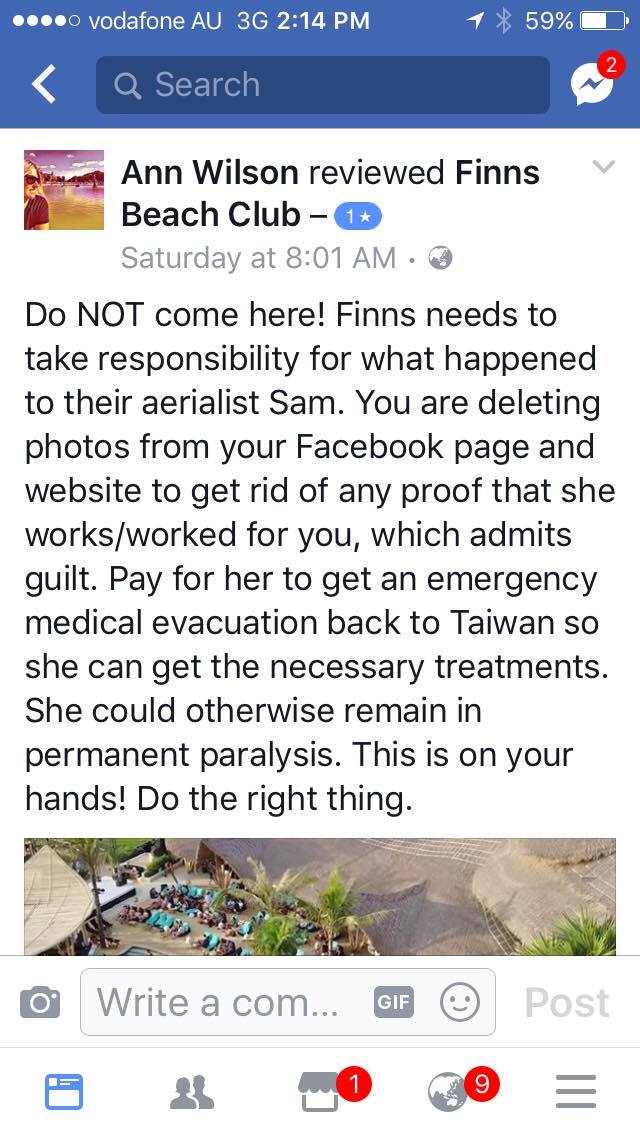
The club is owned by former Australian footballer Tony Smith, who was previously charged with conspiracy to kidnap a bank executive, according to the BBC.
I reached out for a comment and asked for their account of what happened, for them to address the claim of faulty equipment and why Panda’s medical bills weren’t fully covered. I received a prompt reply back, and as you can see, none of my questions were answered.
Dear Heather
All of the 600 plus staff at Finn’s Bali are praying for Sam at this time.
Finn’s has paid for the best medical care available here in Bali and fully support Sam in her decision to seek medical care in Taiwan where she can be with her family.
We wish her the very best for her ongoing treatment and a swift recovery.
Best regards,
Yuda
Sales & Reservation Executive
The performer is finally in Taiwan thanks to the funds raised for the medevac. Her surgery was successful and Panda wrote another update about the situation.
“Good morning all you babes out there who sent me SO MUCH positivity, because it fucking worked. I don’t remember much after the surgery except that I didn’t think it had even started yet, and that I called my doctor an asshole for slitting my throat, but also that I loved him for the huge success. I’m in pain, but I can tolerate it, and I think Rockstar needs a break. If you’re in the mood to swing by, feel free. Visitors help me a lot.”
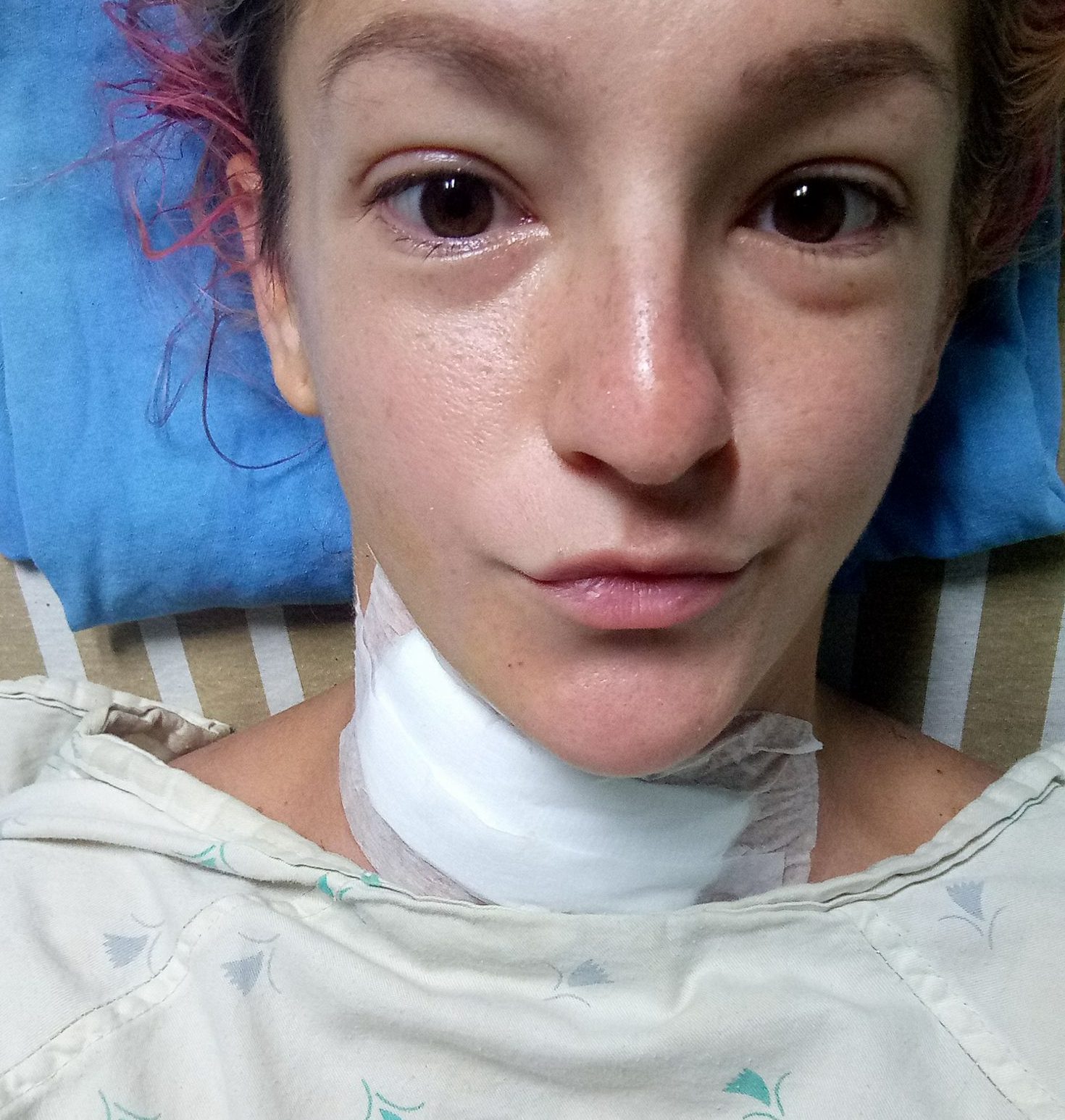
While it seems like Panda is on the road to recovery—a long, expensive, painful recovery—experts in the field say this could have been prevented and that the accident was in no way Panda’s fault.
Scott Osgood, who has 40 years of experience and is the founder of Acrobatic Solutions and an acrobatic equipment and rigging system designer, exclusively talked to The Voluntourist.
“From viewing the video, and with my understanding of the equipment, nothing snapped on the rigging. It is clear to me that the electric winch that was supporting Sam and her Lyra was overcome by the small dynamic force generated from her acrobatic movement. The winch gearbox was not able to hold the dynamic force, the gearbox allowed the winch to backwind, once the winch started to backwind, the resistance decreased and the rate of fall increased.”
He added, “As I understand, the winch that Sam Panda was provided by Finn’s Beach Club has NONE of the above standard safety equipment installed. A simple brake costing a few hundred dollars would have made all the difference in the world for Sam. This tragic incident could have been avoided with a few standard precautions.”

Ray Pierce, a professional rigger since 1973 who specializes in aerial, designs rigging solutions, lectures on advance aerial rigging techniques and is founder of Hollywood Aerial Arts, agrees.
“There was a small metal disc called the lineweight and the specific hook that was used on this leads me to believe that it appears much like a very inexpensive hoist, which is a small $200 little motor that you would use in an automative shop to lift stuff off the ground. To put it on a desk or something like that. They are very good for that application where there’s not a lot of risk involved. A hoist is different from a winch. A winch is something that pulls. A hoist is something it lifts, which means there has to have [sic] some sort of mechanical break on there so when it lifts it up, it will stay in the air. Based on what I said, it appeared she did a move called a “drop” that exerts excess force on the system. When that force was exerted, it appeared the break failed and it unspooled, which allowed her quickly descend to the ground.”

He added, “There was no breakage in the wire, the hook didn’t fail, the rigging above it didn’t fail because something would have fallen down on the ground. The only thing it appears to be is a break failure in whatever the system was that was holding her up. That wasn’t seen, but the only reason why I’m making that conclusion is because I recognize the hook and the lineweight that was [sic] on there. And that goes to a very inexpensive hoist that should never be used for aerial work for any circumstances. It appears the motor gave out in someway, which allowed the wire to unspool.”
So what exactly is a rigger? Pierce explained.
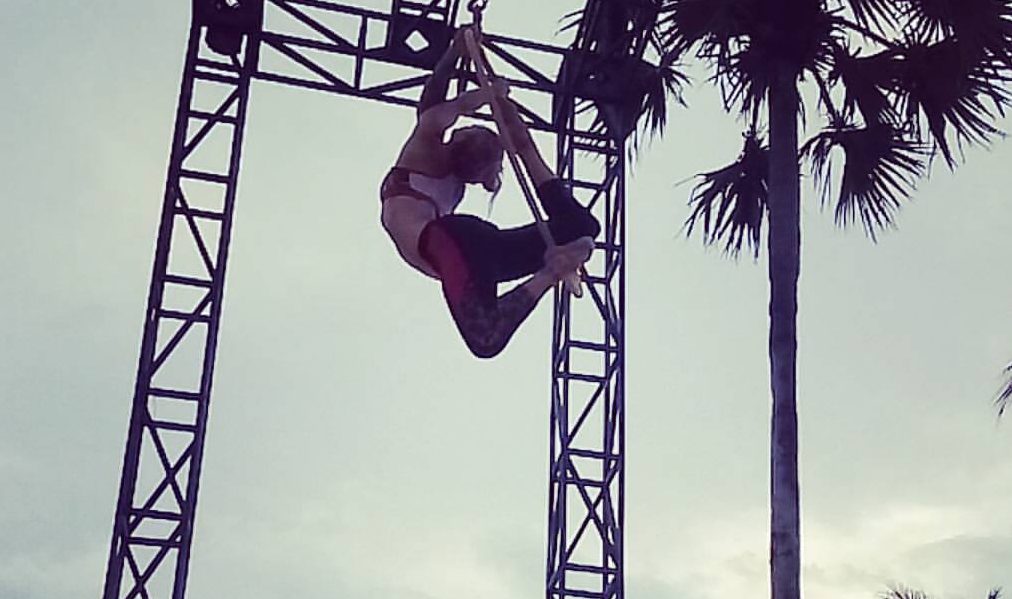
“There’s a missing link between what people come up with as an idea and bringing it to life. So you have the creative part of that, which is someone who says, ‘I want to have a girl spin up in the air and twirl over and land over here.’ That’s a creative concept, and the rigging design group is one that actually brings that to life and says, ‘of the five ways of doing it, here’s the safest.”

Liz Cooper, who is an aerial instructor and performer in Winnipeg, Canada, also talked to the Voluntourist exclusively and revealed how safety is a big concern in the industry for performers.
“It’s very common. People without direct experience or knowledge simply have no idea of the forces and loads involved in rigging to support human beings.
I once walked away from a nightclub gig when I told them the rigging point they wanted me to use was not adequate. The lighting technician (not an actual trained rigger) said, “oh, it’s fine. We hang big ass speakers from that point all the time. You’re not that heavy.” I answered, “I’m not a big ass speaker…I’m a living human being who would end up paralyzed or dead when that point fails. I’m not using it. It’s not strong enough for any person to hang from safely. Here are the numbers (shown on a rigging calculation app on my phone). Don’t use it.”
Cooper said, “The big problem is that safety is expensive: requires investing in equipment rated for human loading which is far more costly than any off-the-shelf gear from the local hardware store and hiring qualified professionals who charge for their time (and deservedly so). In most cases, venues are trying to cut costs wherever they can and doing so often affects working conditions for performers. When it happens to aerial performers, it can result in serious injury or worse.”
But stated that, “If the risks are managed and planned for correctly, it’s safer than being a football player! I’ve had far fewer injuries from aerial performing than I ever did in dance or gymnastics.”
When more information on the situation and Panda becomes available, I will report back. As mentioned, none of her medical costs are currently being covered by Finn’s so if you’ve like to contribute, click here for her Go Fund Me page. Anything donated is appreciated by Panda and her family and every dollar goes towards her medical expenses.
